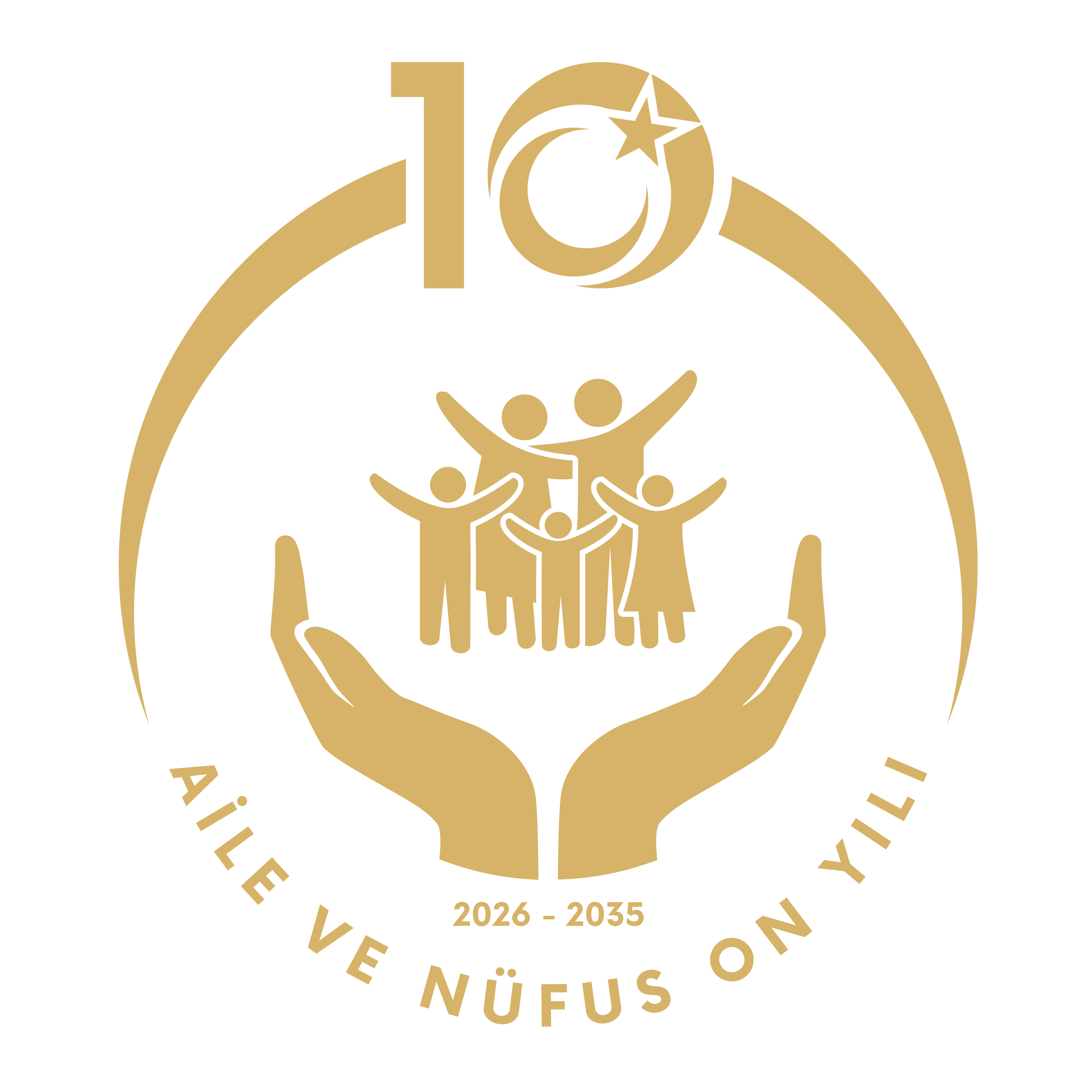Speaker of the Grand National Assembly of Türkiye Mustafa Şentop and Minister Derya Yanık Attended the International Workshop on Elderly Welfare
The "International Workshop on Elderly Welfare ", hosted by the Grand National Assembly of Türkiye (TGNA) and organized in cooperation with the Ministry of Family and Social Services, was held in the Grand National Assembly of Türkiye Ceremony Hall with the participation of Speaker of the Parliament Mustafa Şentop and Minister of Family and Social Services Derya Yanık.
Speaker of the Parliament Şentop, Minister of Family and Social Services Derya Yanık, and Head of the Parliamentary Research Commission on the Problems of Older Persons, AK Party Istanbul Deputy Erol Kaya attended the "International Workshop on Elderly Welfare" held at the Grand National Assembly of Türkiye Ceremony Hall.
In his speech at the opening of the workshop, Speaker of the Grand National Assembly of Türkiye Şentop said that the Parliamentary Research Commission on the Problems of Older Persons, which he led the establishment of, undertook an important task.
Şentop stated that the World Health Organization considers the age limit of 65 and over, and the United Nations (UN) the age limit of 60 and above as old age, and stated that one of the most important issues encountered in the 21st century is the ageing of the world population.
Şentop stated that, according to the UN's Report: "World Population Ageing 2020 ", the decrease in fertility and death rates in addition to increasing life expectancy has increased the proportion of people aged 65 and over, considered as the elderly population, in the total population.
Şentop stating that there were more than 764 million people aged 65 and over around the world last year, and that this number is estimated to exceed 1.5 billion in 2050, reminded that according to TURKSTAT data, in 2021, 24.1 percent of 25 million 329 thousand 833 households in Türkiye had at least one older person.
Şentop, Speaker of the Grand National Assembly of Türkiye, continued as follows:
“The population aged 65 and over will roughly approach 50 percent in 2060 in European Union countries and 25 percent in Türkiye. Older persons are important building blocks of our society with their experience and knowledge. Caring for and respecting older persons is a fundamental element of our culture. The phenomenon of old age, ageing and raising the living standards of older persons is one of the common working areas of many ministries and other public institutions, and we see that these organizations work together and in coordination. The privileged position of older persons in the conscience of our nation also reveals the importance of addressing this issue as a state policy. Our country has come a long way in improving the quality of life of our veteran and senior citizens, and continues to do so."
Emphasizing that the state has taken important remedial steps regarding children and older persons as well as persons with disabilities, Şentop stated that they are aware of President Recep Tayyip Erdoğan's sensitivity and determination on this issue.
"It will soon become unsustainable"
The Speaker of the Grand National Assembly of Türkiye, Şentop, stated that handling the studies on older persons with an approach that sees the future would mean planning the future from today, and said:
“How do we look at the disadvantaged segments of society, especially older persons, and society as a whole? We base all studies and practice on this, on this understanding, on this paradigm. This view, understanding, approach to problems, solution proposals, determines and draws our limits in planning. I also used this word in another program that used this expression, in the credentialing ceremony in Konya. Unfortunately, there are journalists who understand, reveal and distort something else with words that I do not use, but thankfully they are few in number. In modern times, the view of existence, life and human beings has been reduced to an approach based on material and physical production. If you make a material, physical, visible, tangible and economic contribution to social life, you have value. Otherwise, that entity becomes a burden for society. In this regard, the United Nations and other international organizations refer to the population aged 0-14 and over 65 as the dependent population.
A population that is out of production, does not produce economic value, and is dependent on the producing population. According to this Western approach, there is no serious problem, as long as the dependent population does not hold a significant proportion to the producing population. However, if the dependent population constitutes 50 percent of the society in terms of older persons, and approximately 20 percent in terms of 0-14 age groups, as in the 2060 projection, the population producing around 30 percent and the remaining 70 percent dependent on the producer, become an economically dependent population. This understanding, which evaluates society with material production, production with economic compensation, and grasps it by dividing it into parts rather than as a whole organism, will soon become unsustainable by hitting the walls of numerical and physical reality, rather than the walls of conscience, philosophy, and human-based understanding."
Şentop stated that the basic principles regarding the view of older persons in the Islamic and Turkish worlds have a perspective that values human, holistic, material and spiritual production together.
Şentop emphasizing that besides a change in understanding, there should be practice in this regard, said: "If we see children and older persons not as the dependent population of production and the capitalist economy, but as separate functional segments of the innate and naturally existing social division of labour, if we understand spiritual production as a valuable element of social life, a change in understanding will yield fruitful results."
"We are preparing effective action plans"
Derya Yanık, Minister of Family and Social Services, stating in her speech that the proportion of the elderly population has increased in many countries, including Türkiye, said: “As the Ministry, we are preparing new and effective action plans to encourage marriage and increase birth rates. We are preparing to increase social policy studies in this field with the Family Institute, which we plan to implement next year."
Minister Yanık emphasized that they will strengthen the rights of older persons with the 2030 Ageing Vision Document and expressed that they are also working to increase the living standards and quality of life of older persons.
Explaining that they have expanded "Universities of the Third Age" within the scope of lifelong learning goal, Yanık stated that as of this year, 5,665 older persons have been educated with this service in 11 universities.
Explaining the work done in nursing homes and day centres, Yanık said, "We design our care institutions for older persons in our country as site type, courtyard type and small house type and adapt them to the needs of older persons."
"We continue to raise awareness"
Indicating that they support the services of municipalities for older persons within the scope of the Elderly Support Program (YADES), Yanık reminded that 39 million liras were transferred in 6 years and that they reached 111 thousand 559 older persons with the program.
Minister Yanik continued her words as follows:
“We continue to work with various service models such as home care, day care, home health, moral support, volunteering activities and integrated care services without leaving anyone behind. Again, with our program called the National Loyalty Program (Ulusal Vefa Programı), through our Social Assistance and Solidarity Foundations, we have started to provide services throughout Türkiye to older persons who have difficulties in doing their daily care at home and who have trouble going to the bazaar or market. In addition to improving services, we continue on our way without neglecting academic studies. We support studies specific to ageing and the opening of ageing research and application centres in universities. With the participation of municipalities, universities and civil society organizations, we continue our awareness raising activities in coordination on the rights of older persons, active and healthy ageing."
Explaining the plans and projects of their ministries in the future, Yanık said: "We will conduct the Türkiye Older Persons Profile Research for the first time in 2023. In the light of age, gender and socioeconomic data, we aim to create more effective social policies for older persons. By updating the data every four years, we plan to improve the transformation of the population structure with measures that will turn it in favour of our nation."
After the speeches, the sessions of the workshop organized in cooperation with the Parliamentary Research Commission on the Problems of Older Persons, the Ministry of Family and Social Services, Ankara University, Ankara University Aging Studies Application and Research Center were held.
Speaker of the Grand National Assembly of Türkiye, Şentop, Minister Yanık and Chairman of the Commission, Kaya visited the painting and ceramics exhibition of Workshops of the Saray Barrier-Free Life Center.















